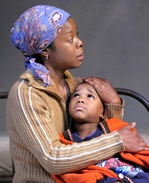HOME PAGE
SITE GUIDE
SEARCH
ADVERTISING AT CURTAINUP
REVIEWS
FEATURES
NEWS
Etcetera and
Short Term Listings
LISTINGS
Broadway
Off-Broadway
NYC Restaurants
BOOKS and CDs
OTHER PLACES
Berkshires
London
California
New Jersey
Philadelphia
Elsewhere
QUOTES
TKTS
PLAYWRIGHTS' ALBUMS
LETTERS TO EDITOR
FILM
LINKS
MISCELLANEOUS
Free Updates
Masthead
Writing for Us
A CurtainUp San Francisco Review
Coming Home
|
If that child ever stops singing, you will know that there is something wrong with the world—Oupa
|

(l to r) Roslyn Ruff and Kohle Thomas Bolton
Oupa (Photo: Kevin Berne) |
This is certainly a soothing maxim for the constantly uprooted, but for many of us, home has a singular definition—and a specific destination. As a dramatic subject, it's no surprise that home is catnip for playwrights, who can endlessly spin its complicated continuum of joy and despair into the full, elaborate kaleidoscope of the human experience.
In his heartrending new play Coming Home, Athol Fugard also dabbles in the drama of the domestic; this time, with the story of a young mother who returns to her native South African village with a small son and a big secret. With sensitive, fine-tuned direction from Gordon Edelstein, who guides the action along at a deliberate, meaningful pace, this production is filled with actors who don't so much embrace their characters as bear-hug them, wringing out performances that are just as moving as they are memorable.
At the fulcrum is Veronica Jonkers, who left the village with big-city dreams of singing stardom, but she returns from Cape Town, years later, with a clutch of secrets and a sheaf of sad stories to tell. But as she uses the key still tied around her neck to step back into her grandfather's tiny, tin-roofed house, her vivacity overflows into the somber space, and she quickly works to cheer up her pensive 5-year-old, Mannetjie, with animated tales of how fantastic life was for her in this place and will be for them. Although Oupa—who appears later as a salty yet benevolent ghost—has already passed on, his memory still clings to the walls like the peeling, faded paint.
But soon enough, they hear the greeting of a real voice from their neighbor (and Veronica's childhood friend) Alfred Witbooi, and this reunion gives way to one of the most joyous, freewheeling moments of any theatrical production I've seen. With pure primal abandon, Veronica and Alfred circle and scamper around each other, letting out piercing cries and whoops that finally culminate into a smothering embrace. It's a visceral, tactile connection that wraps the audience in its ferocity and love. If this is coming home, we'd all be the better for it.
As it turns out, Alfred, who farmed with Oupa, also has a key to the house tied around his neck, and he also has questions for Veronica: Where has she been, and why is she back? In return, she placates him with a song she wrote for him, but refuses to go into details; instead, she asks him to help find her a cleaning job and get her son into school.
Years on, Mannetjie is at the top of his class, Alfred is a constant fixture, and the house has blossomed into a vibrantly textured world. But by then, Veronica can no longer hide her secret. It's not giving too much away to say that Fugard's writing often addresses characters who battle AIDS, and in this rural, repressive society, Veronica must take dramatic measures to ensure that she—and, most imperatively, her son—will always have a place to come home to.
Script-wise, there aren't many surprises in Coming Home; in fact, certain elements of the plot are downright predictable. Instead, it's the characters, especially Veronica and Alfred, and the actors who play them, who give the story its life. Roslyn Ruff's Veronica is a study in the tricky dance of self-presentation as self-preservation; at the beginning, she fills the room with her husky voice and buoyant energy, but it all rings a bit false, as it turns out, because she's "performing" and working hard to put on a show. Ruff artfully shows us the sparkly remains of Veronica's ebullient personality, but eventually she takes us to a deeper, graver, and more truthful place as the character digs into her fate.
Later, the play shifts gears to focus on Alfred, and Thomas Silcott deftly gives the childlike character—who is smart, but not altogether so smart—a sense of innocence that never feels cloying or condescending. Rounding out the cast are Lou Ferguson, who brings gravitas to the earthy yet otherworldly Oupa, and two excellent young actors, Kohle T. Bolton and Jaden Malik Wiggins, who play Mannetjie at different ages.
As a backdrop to these fine performances, the Berkeley Rep's intimate space has been infused with the sights and sounds of South Africa, from John Gromada's infectious, pulsating original music to Eugene Lee's rough-hewn set design. The warm, rich hues that explode across Veronica's walls do as much to tell her story as any monologue.
Coming Home's title suspends the action in its present tense, as if to suggest that we will always be in the process of getting there. Home is something we all seek, whether we cross borders or simply cross the street, but whether you define it as where the heart is or where the furniture is, it will always be the place where the stories are told—and made.
Editor's Note: Fugart's play is likely to continue finding a home on stages and has already done so in Philadelphia and Los Angeles.
|
Coming Home By Athol Fugard Directed by Gordon Edelstein Cast: Roslyn Ruff (Veronica Jonkers), Kohle T. Bolton (Mannetjie Jonkers—Younger), Jaden Malik Wiggins (Mannetjie Jonkers—Older), Thomas Silcott (Alfred Witbooi), Lou Ferguson (Oupa Jonkers) Scenic Design: Eugene Lee Costume Design: Jessica Ford Lighting and Projection Design: Stephen Strawbridge Sound Design: Corrine K. Livingston Original Compositions: John Gromada Voice and Speech Consultant: Lynne Soffer Stage Manager: Michae Suenkel Running Time: 2 hours, 30 minutes, with a 15-minute intermission Berkeley Repertory Theatre, 2025 Addison Street (510) 647-2949 Tickets ($27.00-$71.00) Performances: Tuesdays at 8pm, Wednesdays at 7pm, Thursdays at 2pm and 8pm, Fridays at 8pm, Saturdays at 2pm and 8pm, Sundays at 2pm and 7pm From 1/15/10; opening 1/20/10; closes 2/28/10 Review by Amy Krivohlavek based on performance 1/25/10 |
|
Subscribe to our FREE email updates with a note from editor Elyse Sommer about additions to the website -- with main page hot links to the latest features posted at our numerous locations. To subscribe,
E-mail:
 esommer@curtainup.comesommer@curtainup.com esommer@curtainup.comesommer@curtainup.comput SUBSCRIBE CURTAINUP EMAIL UPDATE in the subject line and your full name and email address in the body of the message -- if you can spare a minute, tell us how you came to CurtainUp and from what part of the country. Visit Curtainup's Blog Annex Curtainup at Facebook . . . Curtainup at Twitter REVIEW FEEDBACK Highlight one of the responses below and click "copy" or"CTRL+C"
Paste the highlighted text into the subject line (CTRL+ V): Feel free to add detailed comments in the body of the email. . .also the names and emails of any friends to whom you'd like us to forward a copy of this review. |






